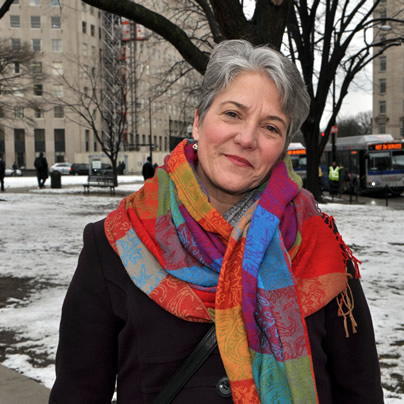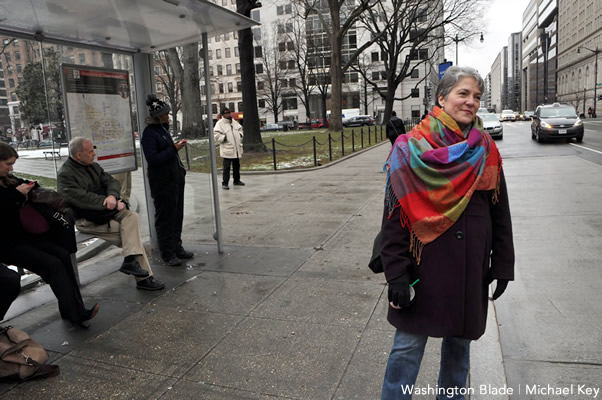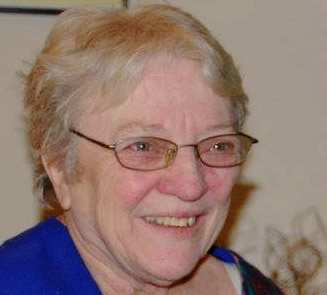National
SPECIAL REPORT In their own words: elders facing poverty, ageism
Older LGBT adults on unemployment, fears for future


‘They never say ‘you’re too old.’ They say, ‘we want someone who graduated more recently,’ said D.C. resident Mary Paradise of her prolonged job search. (Washington Blade photo by Michael Key)
Editor’s note: This is the second of a two-part look at how poverty affects elder members of the LGBT community and part of a yearlong Blade focus on poverty. To share your ideas or personal story, visit us on Facebook or email [email protected]. Click here to read previous installments.
Today — and every day for the next 16 years — 10,000 baby boomers, members of the generation born between 1946 and 1964, will turn 65, according to the Pew Research Center. About 1.5 million gay, lesbian and bisexual elders in the United States are gay. By 2030, that number is expected to increase to nearly 3 million, according to a report by Services and Advocacy for GLBT Elders (SAGE), the Movement Advancement Project and Center for American Progress.
One in six Americans over 65 lives in poverty, according to the Congressional Research Service.
“For LGBT older adults, a lifetime of employment discrimination, among other factors, contribute to disproportionately high poverty rates,” the SAGE website states.
LGBT elders living in or near poverty aren’t just statistics. The Blade interviewed several LGBT elders, aged 50 and older, from St. Louis to Chicago to New York City to Washington, D.C. Here are their stories:
A little peanut butter, maybe some pizza or Ramen noodles is a typical meal for Robyn Sullivan, a 57-year-old transgender woman living in New York City, who struggles to pull together $25 a week for food. In the past, she’s lived in homeless shelters. Now, she lives in a cockroach infested third floor walk-up with four gender non-conforming struggling artists.
“This is the hardest place in the country to live if you don’t make tons of money,” said Sullivan, who suffers from clinical depression and arthritis. “They wanted me to work one day a week for eight hours at a construction site with my limitations to qualify for $190 of food stamps. Working there would be too dangerous.”
Her plight is common among transgender people, Sullivan said. “Dealing with transphobia is nothing I can win at.”
In the 1990s, Sullivan was a skilled software project manager. “I used to make six figures,” she said. “When I was living as a white male professional, I was getting privilege far beyond what any human being deserves. Then I needed to transition and there was the downturn in Silicon Valley.”
After a couple of years, her savings were gone.
“As you go along into poverty, there are things that make people avoid you,” said Sullivan, who now works part-time as a receptionist for SAGE. “I wasn’t hired for a job around the corner from here. They said I wasn’t trustworthy because I lived in a homeless shelter,” she said.
Sullivan encounters not only transphobia but ageism. “When you’re past 50, no company with a retirement plan will hire you,” Sullivan said.
Even with all that she endures, Sullivan says she doesn’t harbor regrets. “When I came out as a trans woman, I felt like I was the woman I was,” she said. “I chose to stop living a lie. Knowing what I know now, I doubt I would have done anything differently.”
It’s not always been as good for him as it is now, 70-year-old Roger Beyers of Chicago told the Blade. But “nobody ever said, life’s going to be a bed of roses,” he said.
Beyers, who retired at 66 after working for 40 years for Jewel, a Chicago area grocer, is HIV positive.
“My income is less than $12,000 per year,” he said. “My housing is subsidized by Chicago House. Before I was admitted to Chicago House, I was on the verge of homelessness. I’m on Medicare and Medicaid.”
Medicaid pays for his HIV medication, Beyers said. “If I had to pay for it, it would cost $18,000. I couldn’t afford it,” he said. “If it were to collapse, I’d be in a fragile position.”
Though he struggles with issues of economic insecurity, he feels that he’s overcoming some of them, Beyers said. He recently started a part-time internship with the Center on Halsted in Chicago.
“My financial situation has dramatically changed,” Beyers said. “There’s a world of difference between living on Social Security and having money left over at the end of the month.”
For one day a week at the Center, he assists with an HIV counseling hotline. “I love it,” Beyers said. “I can say to an HIV-positive person: ‘I’ve been there, done that and survived it all.’”
He finds strength and joy from his boyfriend Eduardo. “A shout-out for my boyfriend! I may end up marrying this man,” he said.
Mary Paradise, 62, a Capital Pride board member and Washington, D.C. resident, has been looking for work for more than a year. She worked as a nurse for 42 years. Paradise, while working as a health marketing consultant, was laid off due to downsizing. Throughout her job search, she’s often encountered ageism, Paradise said.
“They never say ‘you’re too old.’ They say, ‘we want someone who graduated more recently’ or ‘you’re over qualified,’” she said. “I say to them, ‘you must want someone who’s younger.’”
It gets discouraging, Paradise said. She’s used up her savings and in three months her unemployment benefits will run out, unless Congress extends the benefits. “It gets scary,” Paradise said, “it’s a humbling experience. I’ve worked all my life. For Congress to think I’m lazy is insulting.”
But Paradise is optimistic. She volunteers at her church. “My faith is such that I believe I will be taken care of if I just keep moving forward,” she said. “I have friends who are wonderfully supportive. I have some job leads. Something will come my way that’s a perfect fit.”

Barbara Woodruff, 64, of St. Louis says she gets by on her $633 Social Security check each month.
Like many baby boomers, Barbara Woodruff, 64, of St. Louis thought that she had plenty of money put away for retirement. But like far too many people, especially lesbians, she found herself with no savings when she reached retirement age, Woodruff said. She gets by on her monthly $633 Social Security check. Fortunately, Woodruff says, she has Medicare and Medicaid.
“Thank God, that paid for my medication when my thyroid went haywire,” she said. “I’m fortunate. I pay $202 in rent for a nice one-bedroom apartment. It’s HUD-subsidized through the Cardinal Ritter Senior Services housing program.”
Woodruff’s partner of 20 years died in a boating accident in 1988. “When she passed, I lost the house. It was in her name. We didn’t think about those things then,” she said.
Over the years, Woodruff has done everything from working in a nursing recruitment office to running, with a business partner, an event designing business to clerking at a convenience store. “You do what you have to do to put food on the table,” she said.
For several years, Woodruff stopped working to take care of her now deceased mother. “Her Social Security was very little. But I’d do it again,” she said.
Because of her low income, Woodruff doesn’t go out to eat much. “The LGBT community is very supportive here. There’s a great lesbian hangout. I like to see my friends there. I can’t afford to go there now,” she said. “I eat less meat and a lot more fresh fruit and veggies for my health — meat’s expensive.”
Without the social safety net of health insurance and her housing subsidy, she doesn’t know if she’d be alive, Woodruff said.
“I wouldn’t do myself in,” she said. “My friends would make sure I’d have a place to live. I’d be grateful to have a room in their house. But it wouldn’t be my home.”
Pennsylvania
Malcolm Kenyatta could become the first LGBTQ statewide elected official in Pa.
State lawmaker a prominent Biden-Harris 2024 reelection campaign surrogate

Following his win in the Democratic primary contest on Wednesday, Pennsylvania state Rep. Malcolm Kenyatta, who is running for auditor general, is positioned to potentially become the first openly LGBTQ elected official serving the commonwealth.
In a statement celebrating his victory, LGBTQ+ Victory Fund President Annise Parker said, “Pennsylvanians trust Malcolm Kenyatta to be their watchdog as auditor general because that’s exactly what he’s been as a legislator.”
“LGBTQ+ Victory Fund is all in for Malcolm, because we know he has the experience to win this race and carry on his fight for students, seniors and workers as Pennsylvania’s auditor general,” she said.
Parker added, “LGBTQ+ Americans are severely underrepresented in public office and the numbers are even worse for Black LGBTQ+ representation. I look forward to doing everything I can to mobilize LGBTQ+ Pennsylvanians and our allies to get out and vote for Malcolm this November so we can make history.”
In April 2023, Kenyatta was appointed by the White House to serve as director of the Presidential Advisory Commission on Advancing Educational Equity, Excellence and Economic Opportunity for Black Americans.
He has been an active surrogate in the Biden-Harris 2024 reelection campaign.
The White House
White House debuts action plan targeting pollutants in drinking water
Same-sex couples face higher risk from environmental hazards

Headlining an Earth Day event in Northern Virginia’s Prince William Forest on Monday, President Joe Biden announced the disbursement of $7 billion in new grants for solar projects and warned of his Republican opponent’s plans to roll back the progress his administration has made toward addressing the harms of climate change.
The administration has led more than 500 programs geared toward communities most impacted by health and safety hazards like pollution and extreme weather events.
In a statement to the Washington Blade on Wednesday, Brenda Mallory, chair of the White House Council on Environmental Quality, said, “President Biden is leading the most ambitious climate, conservation, and environmental justice agenda in history — and that means working toward a future where all people can breathe clean air, drink clean water, and live in a healthy community.”
“This Earth Week, the Biden-Harris Administration announced $7 billion in solar energy projects for over 900,000 households in disadvantaged communities while creating hundreds of thousands of clean energy jobs, which are being made more accessible by the American Climate Corps,” she said. “President Biden is delivering on his promise to help protect all communities from the impacts of climate change — including the LGBTQI+ community — and that we leave no community behind as we build an equitable and inclusive clean energy economy for all.”
Recent milestones in the administration’s climate policies include the U.S. Environmental Protection Agency’s issuance on April 10 of legally enforceable standard for detecting and treating drinking water contaminated with polyfluoroalkyl substances.
“This rule sets health safeguards and will require public water systems to monitor and reduce the levels of PFAS in our nation’s drinking water, and notify the public of any exceedances of those levels,” according to a White House fact sheet. “The rule sets drinking water limits for five individual PFAS, including the most frequently found PFOA and PFOS.”
The move is expected to protect 100 million Americans from exposure to the “forever chemicals,” which have been linked to severe health problems including cancers, liver and heart damage, and developmental impacts in children.
An interactive dashboard from the United States Geological Survey shows the concentrations of polyfluoroalkyl substances in tapwater are highest in urban areas with dense populations, including cities like New York and Los Angeles.
During Biden’s tenure, the federal government has launched more than 500 programs that are geared toward investing in the communities most impacted by climate change, whether the harms may arise from chemical pollutants, extreme weather events, or other causes.
New research by the Williams Institute at the UCLA School of Law found that because LGBTQ Americans are likelier to live in coastal areas and densely populated cities, households with same-sex couples are likelier to experience the adverse effects of climate change.
The report notes that previous research, including a study that used “national Census data on same-sex households by census tract combined with data on hazardous air pollutants (HAPs) from the National Air Toxics Assessment” to model “the relationship between same-sex households and risk of cancer and respiratory illness” found “that higher prevalence of same-sex households is associated with higher risks for these diseases.”
“Climate change action plans at federal, state, and local levels, including disaster preparedness, response, and recovery plans, must be inclusive and address the specific needs and vulnerabilities facing LGBT people,” the Williams Institute wrote.
With respect to polyfluoroalkyl substances, the EPA’s adoption of new standards follows other federal actions undertaken during the Biden-Harris administration to protect firefighters and healthcare workers, test for and clean up pollution, and phase out or reduce use of the chemicals in fire suppressants, food packaging, and federal procurement.
Maine
Maine governor signs transgender, abortion sanctuary bill into law
Bomb threats made against lawmakers before measure’s passage

BY ERIN REED | On Tuesday, Maine Gov. Janet Mills signed LD 227, a sanctuary bill that protects transgender and abortion providers and patients from out-of-state prosecution, into law.
With this action, Maine becomes the 16th state to explicitly protect trans and abortion care in state law from prosecution. This follows several bomb threats targeting state legislators after social media attacks from far-right anti-trans influencers such as Riley Gaines and Chaya Raichik of Libs of TikTok.
An earlier version of the bill failed in committee after similar attacks in January. Undeterred, Democrats reconvened and added additional protections to the bill before it was passed into law.
The law is extensive. It asserts that gender-affirming care and reproductive health care are “legal rights” in Maine. It states that criminal and civil actions against providers and patients are not enforceable if the provision or access to that care occurred within Maine’s borders, asserting jurisdiction over those matters.
It bars cooperation with out-of-state subpoenas and arrest warrants for gender-affirming care and abortion that happen within the state. It even protects doctors who provide gender-affirming care and abortion from certain adverse actions by medical boards, malpractice insurance, and other regulating entities, shielding those providers from attempts to economically harm them through out-of-state legislation designed to dissuade them from providing care.
You can see the findings section of the bill here:
The bill also explicitly enshrines the World Professional Association of Transgender Health’s Standards of Care, which have been the target of right-wing disinformation campaigns, into state law for the coverage of trans healthcare:
The bill is said to be necessary due to attempts to prosecute doctors and seek information from patients across state lines. In recent months, attorneys general in other states have attempted to obtain health care data on trans patients who traveled to obtain care. According to the U.S. Senate Finance Committee, attorneys general in Tennessee, Indiana, Missouri, and Texas attempted to obtain detailed medical records “to terrorize transgender teens in their states … opening the door to criminalizing women’s private reproductive health care choices.”
The most blatant of these attempts was from the attorney general of Texas, who, according to the Senate Finance Committee, “sent demands to at least two non-Texas entities.” One of these entities was Seattle Children’s Hospital, which received a letter threatening administrators with arrest unless they sent data on Texas patients traveling to Seattle to obtain gender-affirming care.
Seattle Children’s Hospital settled that case out of court this week, agreeing to withdraw its Texas business registration in return for Texas dropping its investigation. This likely will have no impact on Seattle Children’s Hospital, which has stated it did not treat any youth via telemedicine or in person in Texas; the hospital will be able to continue treating Texas youth who travel outside of Texas to obtain their care. That settlement was likely compelling due to a nearly identical law in Washington that barred out-of-state investigations on trans care obtained solely in the state of Washington.
The bill has faced a rocky road to passage. A similar bill was debated in January, but after coming under intense attack from anti-trans activists who misleadingly called it a “transgender trafficking bill,” the bill was voluntarily withdrawn by its sponsor.
When LD 227 was introduced, it faced even more attacks from Gaines and Libs of TikTok. These attacks were followed by bomb threats that forced the evacuation of the legislature, promising “death to pedophiles” and stating that a bomb would detonate within a few hours in the capitol building.
Despite these threats, legislators strengthened both the abortion and gender-affirming care provisions and pressed forward, passing the bill into law. Provisions found in the new bill include protecting people who “aid and assist” gender-affirming care and abortion, protections against court orders from other states for care obtained in Maine, and even protections against adverse actions by health insurance and malpractice insurance providers, which have been recent targets of out-of-state legislation aimed at financially discouraging doctors from providing gender-affirming care and abortion care even in states where it is legal.
See a few of the extensive health insurance and malpractice provisions here:
Speaking about the bill, Gia Drew, executive director of Equality Maine, said in a statement, “We are thrilled to see LD 227, the shield bill, be signed into law by Gov. Mills. Thanks to our pro equality and pro reproductive choice elected officials who refused to back down in the face of disinformation. This bill couldn’t come into effect at a better time, as more than 40 percent of states across the country have either banned or attempted to block access to reproductive care, which includes abortions, as well as transgender healthcare for minors. Thanks to our coalition partners who worked tirelessly to phone bank, lobby, and get this bill over the finish line to protect community health.”
Destie Hohman Sprague of the Maine Women’s Lobby celebrated the passage of the bill despite threats of violence, saying in a statement, “A gender-just Maine ensures that all Mainers have access to quality health care that supports their mental and physical wellbeing and bodily autonomy, including comprehensive reproductive and gender-affirming care. We celebrate the passage of LD 227, which helps us meet that goal. Still, the patterns of violence and disinformation ahead of the vote reflected the growing connections between misogyny, extremism, and anti-democratic threats and actions. We must continue to advocate for policies that protect bodily autonomy, and push back against extremist rhetoric that threatens our states’ rights and our citizens’ freedoms.”
The decision to pass the legislation comes as the Biden administration released updated HIPAA protections that protect “reproductive health care” from out-of-state prosecutions and investigations.
Although the definition of “reproductive health care” is broad in the new HIPAA regulations, it is uncertain whether they will include gender-affirming care. For at least 16 states, though, gender-affirming care is now explicitly protected by state law and shielded from out-of-state legislation, providing trans people and those seeking abortions with protections as the fight increasingly crosses state lines.
****************************************************************************

Erin Reed is a transgender woman (she/her pronouns) and researcher who tracks anti-LGBTQ+ legislation around the world and helps people become better advocates for their queer family, friends, colleagues, and community. Reed also is a social media consultant and public speaker.
******************************************************************************************
The preceding article was first published at Erin In The Morning and is republished with permission.
-

 State Department2 days ago
State Department2 days agoState Department releases annual human rights report
-

 Maryland4 days ago
Maryland4 days agoJoe Vogel campaign holds ‘Big Gay Canvass Kickoff’
-

 Politics3 days ago
Politics3 days agoSmithsonian staff concerned about future of LGBTQ programming amid GOP scrutiny
-

 The White House1 day ago
The White House1 day agoWhite House debuts action plan targeting pollutants in drinking water













